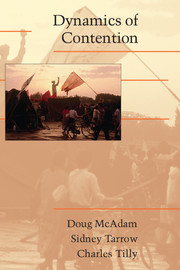Book contents
3 - COMPARISONS, MECHANISMS, AND EPISODES
Published online by Cambridge University Press: 05 June 2012
Summary
Parisian revolutionary struggles, American civil rights, Italian postwar conflicts: The three sequences sketched in Chapters 1 and 2 represent distinctive and well known varieties of contentious politics in the western tradition. Our treatment of them raised standard questions concerning mobilization, actors, and trajectories. In the course of contentious politics: (1) What processes move people into and out of public, collective claim making, and how? (2) Who's who and what do they do? (3) What governs the course and outcomes of contentious interaction? In each case, we found that the standard social movement agenda – social change, mobilizing structures, opportunity – provided a disciplined way of asking questions about the events, but pointed to unsatisfactory answers. The answers were unsatisfactory because they were static, because they provided accounts of single actors rather than relations among actors, and because at best they identified likely connections rather than causal sequences.
Chapters 1 and 2 explored both weaknesses of existing approaches and intellectual resources for repairing those weaknesses. When it comes to the origins and mobilization of contention, we discover that the very definition of the problem in those terms entails serious difficulties: Despite the urge to tell stories having well defined beginnings, middles, and ends, contentious episodes rarely start and stop crisply. Instead, mobilization of some actors, demobilization of others, and transformation of one form of action into another occurs frequently in most complex contention.
- Type
- Chapter
- Information
- Dynamics of Contention , pp. 72 - 88Publisher: Cambridge University PressPrint publication year: 2001



